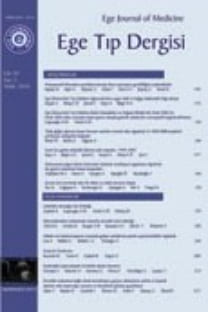Hepatit C virusu ile infekte hastalarda hepatit A ve hepatit B virus serolojileri
Bağışıklama, Hepatit B yüzey antijenleri, İmmünglobulin G, Hepatit C, Hepatit B virüsü, Geriyedönük çalışma, Hepatit A virüs, Hepacivirus, Seroloji, Viral hepatit aşıları
Hepatitis B and hepatitis A virus serologies in patients infected with HCV
Immunization, Hepatitis B Surface Antigens, Immunoglobulin G, Hepatitis C, Hepatitis B virus, Retrospective Studies, Hepatitis A virus, Hepacivirus, Serology, Viral Hepatitis Vaccines,
___
- 1. Lauer GM, Alker BD. Hepatitis C virus infection. N Engl J Med 2001; 345: 41-52.
- 2. Vento S, Garafano T, Renzini C, Cainelli F, Casali F, Ghironzi G, Ferraro T, Concia E. Fulminant hepatitis associated with hepatitis A superinfection in patients with chronic hepatitis C. N Engl J Med 1998; 338:286-90.
- 3. Zarski JP, Bohn B, Bastie A, Pawlotsky JM, Baud M, Bost-Bezeaux F et al. Characteristics of patients with dual infection by hepatitis B and C viruses. J Hepatol 1998; 28: 27-33.
- 4. Lo Re V 3rd, Kostman JR. Management of chronic C. Postgrad Med J 2005; 81:376-82.
- 5. Vento S. Fulminant hepatitis associated with hepatitis A superinfection in patients with chronic hepatitis C. J Viral Hepat 2000; 1: 7-8.
- 6. Tsai JF, Jeng JE, Ho MS, Chang WY, Lin ZY, Tsai JH. Independent and additive effect modification of hepatitis C and B viruses infection on the development of chronic hepatitis. J Hepatol 1996; 24: 271-6.
- 7. Erden S, Büyüközturk S, Çalangu S et al. A study of serological markers of hepatitis B and C viruses in Istanbul, Turkey. Med Princ Pract 2003;12:184-188.
- 8. Mıstık R. Türkiye’de viral hepatit epidemiyolojisi yayınlarının irdelenmesi. Tabak F, Balık İ, Tekeli E (ed) Viral Hepatit 2007. İstanbul: Ohan Matbaası, 2007: 10-50.
- 9. Usluer G. Hepatit C virusu mikrobiyolojisi, patogenez, epidemiyoloji, klinik tedavi ve korunma. Usluer G (ed). Modern Tıp Seminerleri:22 A’dan Z’ye Akut Viral Hepatitler.Ankara: Güneş Kitabevi, 2002: 24-35.
- 10. Sünbül M. HCV infeksiyonunun epidemiyolojisi ve korunma. Tabak F, Balık İ, Tekeli E (ed) Viral Hepatit 2007. İstanbul: Ohan Matbaası, 2007: 208-219.
- ISSN: 1016-9113
- Yayın Aralığı: Yılda 4 Sayı
- Başlangıç: 1962
- Yayıncı: Ersin HACIOĞLU
A critical evalution of imaging findings in parathyroid adenoma
Ayşegül AKGÜN, Ö. MAKAY, N. MUTUKOCA, M. AKYILDIZ
Familial mediterranean faver in the differantial diagnosis of pediatric acute scrotum
Hepatit C virusu ile infekte hastalarda hepatit A ve hepatit B virus serolojileri
N. DEMİRTÜRK, T. DEMİRDAL, M. ALTINDIŞ, Z. AŞÇI
Sıçan torasik aortları vasküler reaktive cevapları bozulmadan soğukta saklanabilir
Anacak Günay YETİK, A. EROL, G.M. ÇINAR, D.J. CATRAVAS
Selma KATALAY, İ. TUĞLU, E. MİNARECİ
Geleceğin cerrahi asistanı tıp eğitimi sırasında cerrahi stajından yeterli yararlanıyor mu?
Özer MAKAYA, P. YAZICI, M. SÖZBİLEN, H. KAPLAN
Lipoma of the ovary: a case report and review of the literature
Metin AKBULUT, O. ZEKİOĞLU, M. TEREK, N. ÖZDEMİR
Ganglionopati nedeni: Sjogren sendromlu olgu
Korkut N. BIÇAK, F.E. BAYAM, Z. ÇOLAKOĞLU
Farklı frekanslardaki ve şiddetlerdeki işitsel uyaranların insanda basit reaksiyon zamanına etkileri
E. BİNBOĞA, M. PEHLİVAN, G. ÇELEBİ
Diyabetik ayakta değişen basınç noktalarının pedografi ile saptanması
